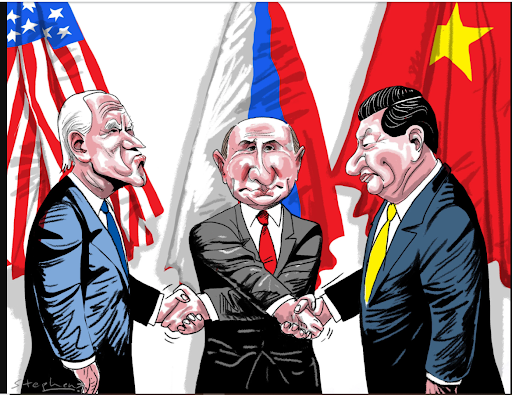Understanding the International System
Understanding the International System
International Relations is becoming increasingly relevant as the world grows more and more interconnected through trade and commerce, migration, the internet and social media, as well as through concerns about pressing global environmental problems. As a field of study, International Relations addresses international political economy, global governance, intercultural relations, national and ethnic identities, foreign policy analysis, development studies, environment, international security, diplomacy, terrorism, media, social movements and much more. Studying International Relations can help to understand the way the world works, and how nations and large international organisations operate.
To understand international relations and its various dynamics, it is important to have a proper understanding of the structure and system in which this whole process of interaction among states and entities takes place. Without discerning the nature of the international system, it is impossible to have a clear, holistic view of world affairs. So, the students of IR and Strategic Studies must have a clear perspective on the nature of the international system so that they could provide an informed and objective analysis on international issues.
The Realist school of thought gives a unique primacy to the international system and international order among the factors defining the nature, characteristics and various dynamics of global politics. Historically, it was the Westphalian sovereignty that practically ruled out any possibility for the states to be governed by any centrally competent authority, the orders of which must be taken by states as obligatory. Although it has now become more systematic anarchy, this nature of the international system is not necessarily a by-product of Peace of Westphalia, 1648. Neorealists count the anarchic structure of the international system as the basis of why the nations act and react the way they do in the international arena. This anarchy has left the states with no other option but to accumulate maximum power and to remain sceptic of the intentions of all; friends and foes alike.
The implications of the prevailing anarchic international system for peace, security and stability of the world are grave. Accumulation of power, realists believe, is the only way to ensure a state’s survival as well as to gain some ‘worth’ for it among the comity of nations. In this structure, no weaker nation is obliged for anything. As there is no morality, no compassion, no legal consideration in international relations for any state, So to remain weaker is the ‘original sin’. Realists, keeping in view the structure, are pessimistic in their opinion about the possibility of a lasting peace among the states.
The United Nations was founded in the post-World War II era to avoid any other such human catastrophe in the future. Realistically, this world body was established on the idea that it will function as a world government and will perform as a regulatory authority above states so that any clash of interest among them may not lead to war. However, firstly, it was not a practical idea in a world comprising sovereign nation-states because no state would be willing to surrender its power and interests to any other power or organization. Secondly, the idealism of establishing justice through the UN was even flouted when five great powers – China, France, Russia, the United Kingdom and the United States – were given the veto power in UN Security Council. Further, countless flaws in the UN’s structure make it just a rubber stamp in the hands of big powers, rendering it impotent to resolve the gigantic issues—from Kashmir to Palestine and so on. The UN has repeatedly proved itself a pawn in the hands of its largest donor, the incumbent superpower, the United States. Practically, these powerful countries have no obligations to the UN, howsoever flagrant violators of the UN Charter they might be. So, the realists posit that there is, literally, no real central authority is present on the world stage.
The absence of a higher authority to enforce laws or to regulate relations between and among nation-states means no limit to hostilities. “Troops are abruptly mobilized without apparent warning and – it seems – appropriate justification. Two old foes are suddenly toasting each other in an ancient, decorated conference hall. Rifts, crises and confrontations seem to erupt suddenly.” It’s actually a zero-sum game, all versus all. Alliances are temporary, friendships are uncertain, and convergences are time-bound. The only permanent in this system is a state’s own self; its cherished interests.
Anarchy, however, does not necessarily mean chaos or use of uncurbed violence. There are some ways, per the realists, to have a ‘controlled anarchy’ and to achieve a kind of order and stability in which unrestricted or widespread violence may be avoided. For this, states constitute alliances; formulate regimes for attaining a balance of power. So, despite the absence of any law-enforcing authority in the international arena, a balance of power between rival powers or rival poles can deter them from unleashing misadventures. Then, another way to achieve international stability is through ‘hegemonic stability.’ Understandably, the Hegemonic Stability theory is not averse to the core of realist tradition. In the words of Joshua S. Goldstein, hegemonic stability is “when a hegemon exercises leadership, either through diplomacy, coercion or persuasion; it is actually deploying its ‘preponderance of power’. It means a state’s power or capacity to “single-handedly dominate the rules and arrangements of international political and economic relations.” Both the concepts – balance of power and hegemonic stability – can be better understood through the system of polarity, which, according to experts, is about the number of great powers leading or dominating the global stage. It is the presence of poles or groups of states with distribution of powers on the world stage that depicts where material power is concentrated in the world.


